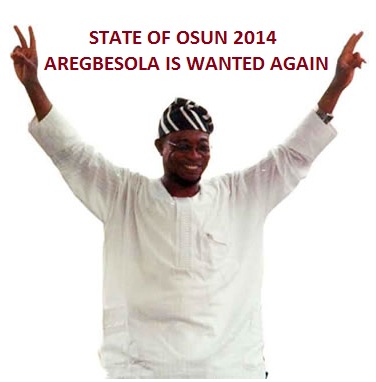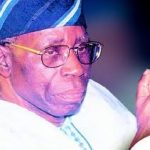
Aregbesola’s 1080 Days Of History Making Achievements
 In the context of the third anniversary of the swearing in of Ogbeni Rauf Adesoji Aregbesola as the fourth democratically elected governor of the state of Osun , the title of this essay would suggest that Aregbesola is staging a performance indicative of an eventual rating of historic magnitude. That immediately raises a question of what constitutes history in relation to the role of an individual.
In the context of the third anniversary of the swearing in of Ogbeni Rauf Adesoji Aregbesola as the fourth democratically elected governor of the state of Osun , the title of this essay would suggest that Aregbesola is staging a performance indicative of an eventual rating of historic magnitude. That immediately raises a question of what constitutes history in relation to the role of an individual.
It is true that irredeemable idealists start out with a mindset to make history. But as Karl Max conclusively puts it, “Men make their own history but they did not make it as they please. They do not make it under circumstances chosen by themselves, but under circumstances directly encountered, given and transmitted from the past”. Making history is thus not a function of the individual’s wish to make history. Rather, it is the situation on ground and the creative interpretation of that situation in the context of balance of social forces that constitutes the making of history.
Applied to Rauf Aregbesola, let me start with the proposition that no governor in Nigeria inherited a more horrible objective situation than he did. Aside from the fact that the state is one of the poorest in the country, there was a real crisis of alienation. This was in terms of a total disconnect between the government and the people . There is history in the speed and deftness with which Aregbesola’s regime was able to recognize this dangerous situation and successfully restored responsibility and responsiveness in governance. His arrival in the Government House on November 27, 2010 signaled a new dawn for a state hitherto ravaged by locusts and savagely raped by interlopers imposed by do or die political brinkmanship and bogged down by a huge debt burden. Dilapidated infrastructures, an abysmal low workers’ morale, disorganized education sector, an health sector which was on life support and an unacceptable internally generated revenue stared him in the face.
With doggedness, determination, commitment, diligence and well thought out policies, Ogbeni Rauf Adesoji Aregbesola tackled headlong the problems confronting the state one after the other and the state of virtue is now enjoying a new lease of life. That the state of Osun is now one state matching assuredly and proudly amongst other states in the Nigerian family is an exclusively Aregbesola’s achievement. This restoration is a product of a moral warfare against any elite attributes that goes against the grain of service, discipline, social commitment and honor. As the leading provider of the perspectives and the key sustainer of the tempo of this praxis, Aregbesola emerges as an archetype of Plato’s Philosopher- King not in the sense of an all-knowing leader but in the sense of a person whose experience and exposure in life is such that he or she is capable of informed and balanced decisions. Aregbesola, therefore, draws our attention to further reflections on Plato’s argument that leaders must be prepared for leadership. Not a few will agree with this writer that if Nigeria is going to go any where in this dispensation, it is people like Aregbesola that would do it. In a typical third world country like Nigeria, as Aregbesola always tells any one who has the patience to listen, leadership is beyond building roads, providing boreholes, renovating schools or rehabilitating dilapidated structures important as these are, for almost any body can do that. Leadership is also and more importantly about mass mobilization as the corner stone of governance. The situation in most parts of Africa requires leaders who consistently alert the mass of the people on certain requirements of modernization, however one understands the concept.
That is one way of dealing with the problem of cultural constraints on development the way many African radicals and leaders like Nkrumah, Cabral, Nyerere tried to do. All great modern leaders like Mao and Lee Kuan Yew did so and led personal campaigns against things as little as poor personal hygiene, poor environmental sanitation, inertia and lethargy, adventurism, drug abuse and so on and so forth. It is very good for instance, that it amounts to inviting Governor Aregbesola’s trouble to be seen by him or his aides on environmental sanitation days that you are not cleaning your environment or throwing refuse indiscriminately on the street. Preceding the programme of mobilizing the people and heavy infrastructural intervention especially in housing, education, health and the environment as Aregbesola’s regime has done is the stuff of history in the making. It is also history in the making any where in the third world where the leader influences the legislation of giving a monthly stipend to the poor, vulnerable and the elderly. The recruitment of 50,000 unemployed graduates for community service, sending 30 unemployed youths to Germany for modern training in agriculture, re-training 300 artisans in modern methods, information and communication technology training for 5,000 unemployed youths through OYESTECH, selling of cheaper fertilizers to farmers, free training of 3,000 youths in tailoring, giving loans to youths interested in agriculture, setting up of farm settlements to train unemployed graduates, free meals for primary school students which led to increase in enrolment in primary schools, building of modern markets for traders, the farmers train project are encapsulated in Aregbesola’s administration’s six-point integral action plan that seeks to banish hunger, unemployment, restore healthy living, promote functional education and enhance communal peace and progress.
This sense of social and redistributive justice is what has informed the conclusion that when governments in developing countries are withdrawing social protection for their citizens in order to appease the market-oriented international community, the Governor of the state of Osun, Rauf Aregbesola, is reversing the trend of history by bringing back the idea of social protection for the elderly and unemployed youths. This is precisely the history that is in the making. In other words, these dynamics must draw our attention to the imperative of enlightened leadership in Nigerian politics. Only a leader with some ideological preparation and a crusading commitment can take society any where. Aregbesola’s case must be instructive. His resume shows his training as a Mechanical Engineer, a former student activist who believes in communism (two of his heroes that I know are Amica Cabral and Fidel Castro) and as a pro-democracy activist. His experience in politics dates back to 1992 when he first attempted to contest for a seat in the House of Representatives but lost his to opponent in his party’s primary and then his stint as Lagos state Commissioner for Works from 1999 till 2007. A major consequence of these experiences is Aregbesola’s strategic consciousness. Being a strategist is what has shielded him from the combined dangers of his bluntness, militancy and huge ego.
•Aminu is the National Coordinator, Oodua Youths For Good Governance
There is, therefore, evidence of his being ideologically prepared for leadership. His 8-year stint as the best Commissioner for Works in Lagos state adequately prepared him for his present job of the governor of the state of Osun.
Governor Aregbesola, though has his own shortcomings(Nobody is infallible), but his larger than life resolve to guard his hard earned integrity by fulfilling his constitutional assignment and social pacts with the people of the state is worthy of commendation by all and sundry. There is no gainsaying that the current man in the saddle in the state of Osun, has demonstrated the capacity to solve problems and make positive changes in the lives of the people. The innovation and ingenuity he brought into government business has translated into increased performance in all sectors of the state’s economy. He understands the difference between being a politician and being a leader and that leadership must be marked by explaining, convincing and winning over the other half, not by intrigue, cynical manipulation and diabolical politics which explains the leadership disaster at all levels in Nigeria today. His reward is the popular surge that makes crowd control and arena management such a nightmare any where he goes throughout the state.
The bonding between the government and the governed has unleashed the dynamism that defines the ‘The New Osun’ since November 27, 2010. It is true that a lot of these revolve around Ogbeni Rauf Aregbesola’s persona, radius and dynamism. It is therefore, an Aregbesola momentum but it is also acquiring a momentum beyond Aregbesola as a person. My contention is that what is happening in Osun should interest all of us with particular reference to the leadership requirement for transformative politics in the present epoch. Historians and coming generations will regard the services Aregbesola is rendering to the people of the state of Osun as imperishable and must interest our students of political development because it is history in the making.
SUNNEWS



